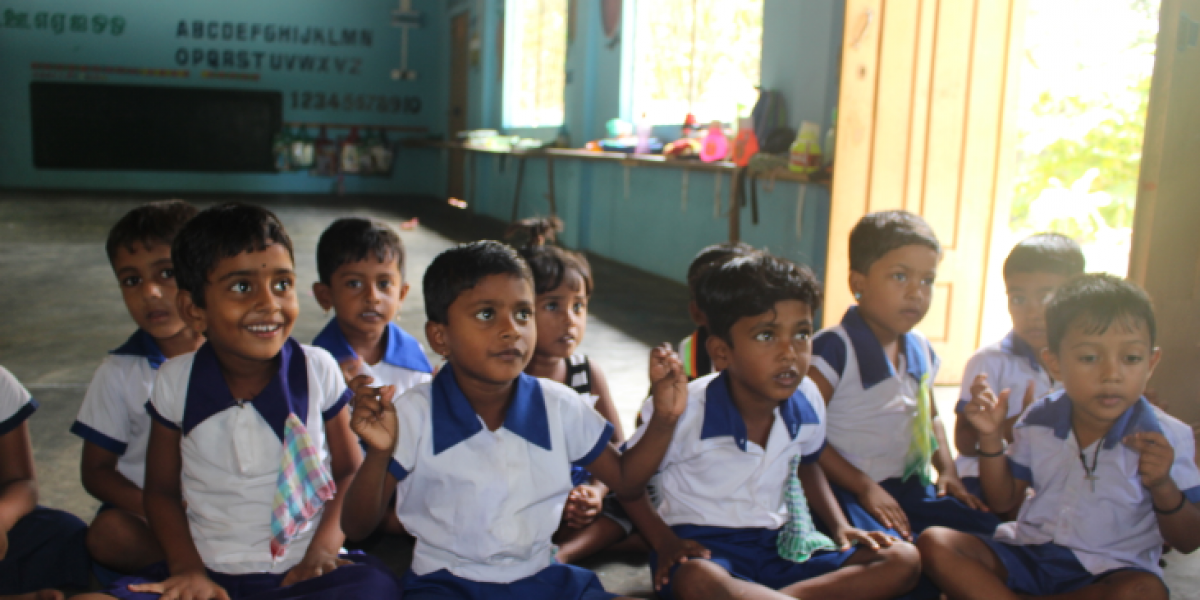Sri Lanka: A Tribute To Years of Service
15 May 2017|Danielle Vella, JRS Mission and Identity Officer

“Although almost paralyzed, it was clear that Fr. Arrupe wanted to ask me a question but could not find the words, so Br Bandera, the infirmarian, brought him paper and pencil. With his left hand, Fr. Arrupe shakily drew a map of India, then the droplet shape of the island next to it. By pointing to the island, clearly he was asking me, ‘What is JRS doing to help the people of Sri Lanka?’”
Mark Raper SJ then Director of JRS Asia Pacific, remembers how Pedro Arrupe asked him this compelling question when they met at the Jesuit Curia in Rome back in the 1980s. It was hardly surprising that the former Jesuit General and founder of JRS, then incapacitated by a stroke, felt strongly about Sri Lanka. The island was engulfed in a brutal civil war that pitted ethnic groups against one another. Hundreds of thousands of people were displaced, mostly within Sri Lanka itself, with many also fleeing to India and, if they could afford to, further afield.
The war in Sri Lanka ended in 2009 with the military triumph of the armed forces, dominated by the Sinhalese majority, over the rebel Liberation Tigers of Tamil Eelam (LTTE). The ending was as brutal as the rest of the war: a UN panel estimated that as many as 40,000 Tamils may have been slaughtered in the crossfire.
JRS accompanied people displaced by the war through thick and thin, even during the so-called “final phase” and its telling aftermath, when Tamils fleeing the war zone were detained. Indeed, JRS has been present in one way or other in the war-torn north and east of Sri Lanka since 1995, when it started to support two Sri Lankan Jesuits, Fr Daniel and Fr Joel, who chose to accompany their people throughout bombardments, deprivation, and constant fear.
It is this unswerving loyalty for which JRS will be most remembered when it leaves Sri Lanka, which it will do in June 2017, handing the baton back to the Sri Lankan Jesuit Province after all these years.
I visited Sri Lanka late last year, and this is something I heard again and again from the largely Tamil staff who have worked for JRS. They stressed that JRS had never abandoned them and also credited the organisation with reaching isolated villages in rural and rebel- held areas, which were neglected by others. “We did not go in search of JRS; JRS came in search of us,” I heard teachers say again and again.
JRS gradually built its operations over the years. Vinny Joseph SJ, Director of JRS Sri Lanka from 2002 to 2007, says JRS expanded its network thanks to parish priests who helped to identify need and opportunities, to religious sisters who ran residential life-skills centers with JRS, and to the young women who attended the centers. After graduating from the life-skills courses, many went on to work for JRS in their own villages and towns across the north-east.
Fr Vinny recalls: “We had several life-skills centers. In six months, we taught life-skills, personality development, motivation for life, leadership, and the JRS mission and vision. We selected the best to work for JRS as coordinators and teachers. In that way, we had a great network in almost all the Tamil areas. So, we could go anywhere, no problem, even the LTTE areas.”
JRS ran primarily informal education, skills-training and psychosocial programs, and also provided material aid for those in great need. Many feel that the contribution of JRS truly helped to improve flagging standards of education.
Ravichchanthiran Saththiyabam, a woman in her mid-twenties who works as a pre-school teacher for JRS, told me: “Before JRS came to our village in Batticaloa, the area was very poor in education. Now it has really come forward thanks to JRS. I am an example of this, I come from a village where we never saw anyone’s name in print and then my name appeared in 2002 in the students’ magazine. I was a student at the JRS evening tuition center at the time. Seeing my name really gave me a boost and motivated me to do more.”
When a devastating Tsunami struck in 2004, JRS widened its focus to offer emergency aid to thousands of people. The fact that JRS had a network across the north-east enabled a swift response.
The reality is that as Sri Lankans, the JRS staff were grievously affected too by the war and natural disaster, and were willing to do whatever they could for “our people”. At times, they took great risks to reach people in need. Fr Packiaranjith, a 40-year-old priest from the northern diocese of Mannar and JRS coordinator, was killed on 25 September 2007 when a claymore mine blew up his vehicle as he traveled through LTTE territory to deliver aid.
When the war was over, JRS Sri Lanka persevered with its education programs and to assisted displaced people to resettle or return home. In 2015, JRS started an initiative to offer higher education together with Jesuit Worldwide Learning (JWL). Now, when JRS leaves, the remaining pre-school and JWL programs will be handed over to the Jesuit province.
But JRS leaves another impressive legacy, which I saw last year: a body of people with a strong sense of shared ownership and understanding of the mission of JRS, who are eager to contribute to building the truly inclusive and peaceful future that still eludes Sri Lanka.
I think Fr Arrupe would have found an answer to his anxious question, about JRS and Sri Lanka, in the words of Saththiyabam. The young Hindu woman had this to say: “JRS taught us not to discriminate. How? Pedro Arrupe founded JRS?and he was Christian. If he said JRS was only for Christians, then you would not have helped us. So, we must follow his example. Even where others hesitate to go, we should go because of the spirit of Arrupe, who told us to reach those places no one else does.


